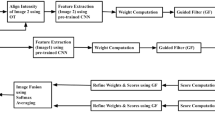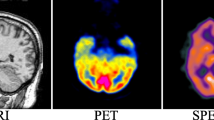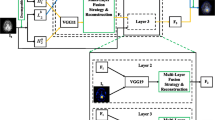Abstract
The fusion of multimodal medical images has garnered painstaking attention for clinical diagnosis and surgical planning. Although various scholars have designed numerous fusion methods, the challenges of extracting substantial features without introducing noise and non-uniform contrast hindered the overall quality of fused photos. This paper presents a multimodal medical image fusion (MMIF) using a novel deep convolutional neural network (D-CNN) along with preprocessing schemes to circumvent the mentioned issues. A non-linear average median filtering (NL-AMF) and multiscale improved top-hat (MI-TH) approach are utilized at the preprocessing stage to remove noise and improve the contrast of images. The non-linear anisotropic diffusion (NL-AD) scheme is employed to split the photos into base and detailed parts. The fusion of base parts is accomplished by a dimension reduction method to retain the energy information. In contrast, the detailed parts are fused by novel D-CNN to preserve the enriched detailed features effectively. The simulation results demonstrate that the proposed method produces better brightness contrast and more image details than existing methods by acquiring 0.7649 to 0.8986, 0.3520 to 0.4783, 0.7639 to 0.9056, 68.8932 to 81.0487 gain for quality transfer ratio from source photo to a generated photo (\(Q_{G}^{AB}\)), feature mutual information (FMI), structural similarity index (SSIM), and average pixel intensity (API) respectively.

















Similar content being viewed by others
Explore related subjects
Discover the latest articles, news and stories from top researchers in related subjects.References
Karim S, Tong G, Li J, Qadir A, Farooq U, Yiting Y (2023) Current advances and future perspectives of image fusion: a comprehensive review. Information Fusion 90:185–217. https://doi.org/10.1016/j.inffus.2022.09.019
Aamir M, Rahman Z, Dayo ZA, Abro WA, Irfan Uddin M, Khan I, Imran AS, Ali Z, Ishfaq M, Guan Y, Zhihua H (2021) A deep learning approach for brain tumor classification using MRI images. Comput Electr Eng 101:108105. https://doi.org/10.1016/j.compeleceng.2022.108105
Hermessi H, Mourali O, Zagrouba EJSP (2021) Multimodal medical image fusion review: theoretical background and recent advances. Signal Process 183:108036. https://doi.org/10.1016/j.sigpro.2021.108036
Bhutto JA, Tian L, Qiliang D, Sun Z, Lubin Y, Soomro TA (2022) An improved infrared and visible image fusion using an adaptive contrast enhancement method and deep learning network with transfer learning. Remote Sens 14(4):939. https://doi.org/10.3390/rs14040939
Azam MA, Khan KB, Salahuddin S, Rehman E, Khan SA, Khan MA, Kadry S, Gandomi AH (2022) A review on multimodal medical image fusion: compendious analysis of medical modalities, multimodal databases, fusion techniques and quality metrics. Comput Biol Med 144:105253. https://doi.org/10.1016/j.compbiomed.2022.105253
Almasri MM, Alajlan AM (2022) Artificial intelligence-based multimodal medical image fusion using hybrid S2 optimal CNN. Electronics 11(14):2124. https://doi.org/10.3390/electronics11142124
Guan Y, Aamir M, Rahman Z, Ali A, Abro WA, Dayo ZA, Bhutta MS, Zhihua H (2021) A framework for efficient brain tumor classification using MRI images[J]. Math Biosci Eng 18(5):5790–5815. https://www.aimspress.com/article/doi/10.3934/mbe.2021292
Li Y, Zhao J, Lv Z, Li J (2021) Medical image fusion method by deep learning. Int J Cogn Comput Eng 2:21–29. https://doi.org/10.1016/j.ijcce.2020.12.004
Kong W, Li C, Lei Y (2022) Multimodal medical image fusion using convolutional neural network and extreme learning machine. Front Neurorobot 16:1050981. https://doi.org/10.3389/fnbot.2022.1050981
Lou X-C, Feng XJC, Juhola M (2021) Medicine, multimodal medical image fusion based on multiple latent low-rank representation. Comput Math Methods Med:1–16. https://doi.org/10.1155/2021/1544955
Wang X, Hua Z, Li J (2023) Multi-focus image fusion framework based on transformer and feedback mechanism. Ain Shams Eng J 14(5):101978. https://doi.org/10.1016/j.asej.2022.101978
Zhou T, Li Q, Huiling L, Cheng Q, Zhang X (2023) GAN review: models and medical image fusion applications. Inform Fusion 91:134–148. https://doi.org/10.1016/j.inffus.2022.10.017
Soomro TA, Khan TM, Khan MAU, Gao J, Paul M, Zheng L (2018) Impact of ICA-based image enhancement technique on retinal blood vessels segmentation. IEEE Access 6:3524–3538. https://doi.org/10.1109/ACCESS.2018.2794463
Aamir M, Yi-Fei P, Rahman Z, Tahir M, Naeem H, Dai Q (2018) A framework for automatic building detection from low-contrast satellite images. Symmetry 11(1):3. https://doi.org/10.3390/sym11010003
Bhutto JA, Lianfang T, Qiliang D, Soomro TA, Lubin Y, Tahir MF (2020) An enhanced image fusion algorithm by combined histogram equalization and fast gray level grouping using multi-scale decomposition and gray-PCA. IEEE Access 8:157005–157021. https://doi.org/10.1109/ACCESS.2020.3018264
Ma W, Wang K, Li J, Yang SX, Li J, Song L, Li Q (2023) Infrared and visible image fusion technology and application: a review. Sensors 23(2):599. https://doi.org/10.3390/s23020599
Choudhary G, Sethi D (2022) From conventional approach to machine learning and deep learning approach: an experimental and comprehensive review of image fusion techniques. Arch Comput Methods Eng 30:1267–1304 https://link.springer.com/article/10.1007/s11831-022-09833-5
Tawade L, Aboobacker AB, Ghante F (2014) Image fusion based on wavelet transforms. Int J Bio-Sci Bio-Technol 6(3):149–162. https://doi.org/10.14257/ijbsbt.2014.6.3.18
Shreyamsha Kumar BK (2013) (2012), multifocus and multispectral image fusion based on pixel significance using discrete cosine harmonic wavelet transform, in signal. Image Video Process 7:1125–1143 https://link.springer.com/article/10.1007/s11760-012-0361-x
Gao G, Xu L, Dongzhu F (2013) Multi-focus image fusion based on non-subsampled shearlet transform. IET Image Process 7(6):543–639. https://doi.org/10.1049/iet-ipr.2012.0558
Tawfik N, Elnemr HA, Fakhr M, Dessouky MI, Abd El-Samie FE (2022) Multimodal medical image fusion using stacked auto-encoder in NSCT domain. J Digit Imaging 35:1308–1325 https://link.springer.com/article/10.1007/s10278-021-00554-y
Nagaraja Kumar N, Jayachandra Prasad T, Satya Prasad K (2022) An intelligent multimodal medical image fusion model based on improved fast discrete Curvelet transform and Type-2 fuzzy entropy. Int J Fuzzy Syst 25:96–117 https://link.springer.com/article/10.1007/s40815-022-01379-9
Shreyamsha Kumar BK (2013) Image fusion based on pixel significance using cross bilateral filter. SIViP 9:1193–1204 https://link.springer.com/article/10.1007/s11760-013-0556-9
Liu Y, Chen X, Ward RK, Jane Wang Z (2016) Image fusion with convolutional sparse representation. IEEE Signal Process Lett 23(12):1882–1886. https://doi.org/10.1109/LSP.2016.2618776
Li X, Zhang X, Ding M (2019) A sum-modified-Laplacian and sparse representation based multimodal medical image fusion in Laplacian pyramid domain. Med Biol Eng Comput 57:2265–2275 https://link.springer.com/article/10.1007/s11517-019-02023-9
Rajalingam B, Fadi Al-Turjman R, Santhoshkumar MR (2020) Intelligent multimodal medical image fusion with deep guided filtering. Multimed Syst 28:1449–1463. https://link.springer.com/article/10.1007/s00530-020-00706-0
Wang L, Dou J, Qin P, Lin S, Gao Y, Wang R, Zhang J (2021) Multimodal medical image fusion based on nonsubsampled shearlet transform and convolutional sparse representation. Multimed Tools Appl 80:36401–36421. https://link.springer.com/article/10.1007/s11042-021-11379-w
Guo P, Xie G, Li R, Hui H (2022) Multimodal medical image fusion with convolution sparse representation and mutual information correlation in NSST domain. Complex Intell Syst 9:317–328 https://link.springer.com/article/10.1007/s40747-022-00792-9
Li H, Wu X-J (2018) Infrared and visible image fusion using latent low-rank representation. Comput Vis Pattern Recognit 5:6. https://doi.org/10.48550/arXiv.1804.08992
Tawfik N, Elnemr HA, Fakhr M, Dessouky MI, Abd El-Samie FE (2021) Hybrid pixel-feature fusion system for multimodal medical images. J Ambient Intell Humaniz Comput 12:6001–6018. https://link.springer.com/article/10.1007/s12652-020-02154-0
Venkatesan B, Ragupathy US (2022) Integrated fusion framework using hybrid domain and deep neural network for multimodal medical images. Multidim Syst Sign Process 33:819–834 https://link.springer.com/article/10.1007/s11045-021-00813-9
Soomro TA, Afifi AJ, Gao J, Hellwich O, Zheng L, Paul M (2019) Strided fully convolutional neural network for boosting the sensitivity of retinal blood vessels segmentation. Expert Syst Appl 134(15):36–52. https://doi.org/10.1016/j.eswa.2019.05.029
Aamir M, Rahman Z, Abro WA, Tahir M, Ahmed SM (2019) An optimized architecture of image classification using convolutional NeuralNetwork. Int J Image Graph Signal Process 10:30–39 https://www.mecs-press.org/ijigsp/ijigsp-v11-n10/IJIGSP-V11-N10-5.pdf
Soomro TA, Afifi AJ, Zheng L, Soomro S, Gao J, Hellwich O, Paul M (2019) Deep learning models for retinal blood vessels segmentation: a review. IEEE Access 7:71696–71717. https://doi.org/10.1109/ACCESS.2019.2920616
Zhang L, Li H, Zhu R, Ping D (2022) An infrared and visible image fusion algorithm based on ResNet-152. Multimed Tools Appl 81:9277–9287. https://link.springer.com/article/10.1007/s11042-021-11549-w
Feng Y, Houqing L, Bai J, Cao L, Yin H (2020) Fully convolutional network-based infrared and visible image fusion. Multimed Tools Appl 79:15001–15014 https://link.springer.com/article/10.1007/s11042-019-08579-w
Xu L, Jimmy SJ, Ren CL, Jia J (2014) Deep convolutional neural network for image deconvolution. In: Advances in neural information processing systems 27 (NIPS 2014). https://proceedings.neurips.cc/paper/2014/hash/1c1d4df596d01da60385f0bb17a4a9e0-Abstract.html
Krokos V, Xuan VB, Bordas SPA, Young P, Kerfriden P (2021) A Bayesian multiscale CNN framework to predict local stress fields in structures with microscale features. Comput Mech 69:733–766 https://link.springer.com/article/10.1007/s00466-021-02112-3
Perona P, Malik J (1990) Scale-space and edge detection using anisotropic diffusion. IEEE Trans Pattern Anal Mach Intell 12(7):629–639. https://doi.org/10.1109/34.56205
Bhutto JA, Tian L, Qiliang D, Sun Z, Lubin Y, Tahir MF (2022) CT and MRI medical image fusion using noise-removal and contrast enhancement scheme with convolutional neural network. Entropy 24(3):393. https://doi.org/10.3390/e24030393
Author information
Authors and Affiliations
Corresponding author
Ethics declarations
Conflict of interest
The authors declare no conflict of interest in this research work.
Additional information
Publisher's Note
Springer Nature remains neutral with regard to jurisdictional claims in published maps and institutional affiliations.
Rights and permissions
Springer Nature or its licensor (e.g. a society or other partner) holds exclusive rights to this article under a publishing agreement with the author(s) or other rightsholder(s); author self-archiving of the accepted manuscript version of this article is solely governed by the terms of such publishing agreement and applicable law.
About this article
Cite this article
Bhutto, J.A., Guosong, J., Rahman, Z. et al. Feature extraction of multimodal medical image fusion using novel deep learning and contrast enhancement method. Appl Intell 54, 5907–5930 (2024). https://doi.org/10.1007/s10489-024-05431-z
Accepted:
Published:
Issue Date:
DOI: https://doi.org/10.1007/s10489-024-05431-z




